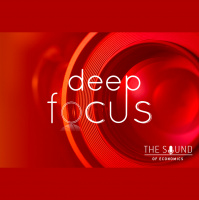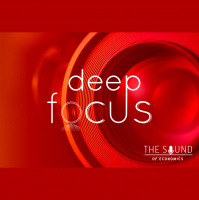Synopsis
Bruegel is the European think tank working in the field of international economics. Established in 2005, Bruegel is independent and non-doctrinal. It seeks to contribute to European and global economic policy-making through open, fact-based and policy-relevant research, analysis and debate.
Episodes
-
S5 Ep41: Backstage: The EU financial services landscape after Brexit
30/04/2019 Duration: 12min**Bruegel fellows Rebecca Christie and Nicolas Véron discuss how the map of the EU's financial services industry has begun to change, and how it might eventually settle.** The Brexit process has begun to unravel the supremacy of London as the financial centre of Europe, yet it remains unclear how the map of the EU's financial system will eventually be refigured. Several cities have emerged to compete not only for the business that is leaving the UK's capital but for new investment as well. This raises broader questions about whether it is more beneficial to have a single hub or to spread financial services across numerous locations. It also poses difficulties for firms that relocate, some of whose general staff may prefer a different destination to that desired by the lawyers and compliance officers. Brexit has set in motion events that will not be undone even if the UK were to throw the process in full reverse, and remain in the EU, and the idea has been mooted that Brexit merely accelerated a desertion o
-
S5 Ep40: Director's Cut: Resuming the EU-US trade talks
23/04/2019 Duration: 25min**Maria Demertzis sits down with Bruegel senior fellow André Sapir to break down the news, discussing the events leading up to the renewed EU-US trade talks, and the likely future course.** On 15 April 2019, the European Council approved mandates for the Commission to resume trade negotiations with the United States, which are to be centered around eliminating industrial tariffs. Although already a breakthrough, the talks are set to encounter many difficulties given their highly political nature. Bruegel's deputy director Maria Demertzis sits down with senior fellow André Sapir to assess the news, discussing the events leading up to the renewed talks and the likely future outcomes. A consistent theme in the making of any EU trade deal is the repeated declaration that it would only engage with countries that are signatories to the Paris Agreement. In 2017, the Trump administration announced the US' intention to withdraw from that agreement, which should in theory exclude the possibility of a trade deal. Mar
-
S5 Ep39: Director's cut: EU-China partnership after the 21st EU-China summit
12/04/2019 Duration: 25min**In this episode of the Director's cut, Guntram Wolff discusses with Alicia Garcia Herrero about the results of the 21st EU-China Summit.** The EU and China committed to further strengthen the EU-China strategic partnership at the 21st EU-China summit. Both sides agreed on a joint statement setting out the direction for EU-China relations in the years to come. Leaders expressed their joint support for multilateralism and rules-based trade. They reaffirmed their joint engagement to reform the World Trade Organisation. The EU and China agreed to work together to address industrial subsidies. They also discussed foreign and security issues in their respective neighbourhoods. Bruegel's director and Alicia Garcia Herrero comment on the joint declaration and the challenges for the next steps in this cooperation. [Further reading on Eu-China on Bruegel website](http://bruegel.org/tag/eu-china/)
-
S5 Ep38: Director’s Cut: How to make Industry 4.0 work for Europe
02/04/2019 Duration: 24min**Bruegel director Guntram Wolff talks to Padmashree Gehl Sampath, a Berkman Klein fellow at Harvard University, on the consequences of ‘new manufacturing’ for European industrial policymaking.** In this Director’s Cut of ‘The Sound of Economics’, Bruegel’s Guntram Wolff discusses Industry 4.0 with Harvard University Berkman Klein fellow Padmashree Gehl Sampath. Europe is yet to truly explore what interventions can and should be made with regard to the digitisation of industrial policy. But the ongoing development of technologies obliges the EU to examine how best to create a level playing-field for companies, and how to ensure that newly compiled sets of data can contribute positively to the welfare of its citizens. The deployment of Europe’s General Data Protection Regulation brought into focus the potential negative consequences of people’s data being amassed. Yet, as the discussants consider here, there are many potential works to which these data can be put that would serve a greater public good. But
-
S5 Ep37: Director's Cut: China's place in the global trading system
28/03/2019 Duration: 36min**Bruegel director Guntram Wolff and senior fellow André Sapir discuss how potential WTO reform might position the organisation differently towards China.** In this Director's Cut of 'The Sound of Economics', Guntram Wolff talks to Bruegel senior fellow André Sapir about his upcoming paper on the WTO reform, specifically what is necessary in order for the Chinese economic system to be compatible with the global multilateral trading system. China has recently been atop the European policy agenda, especially with President Xi's recent visits to Rome and Paris ahead of the EU-China Summit in April. The discussants here walk us through the main challenges in the EU's quest to position itself vis-à-vis China, including the issues of forced technology transfers and the behaviour of Chinese state-owned enterprises. For further reading, we recommend the Bruegel Policy Contribution by Uri Dadush and Guntram Wolff on [how Europe should approach the unfolding crisis in global trade](http://bruegel.org/2019/03/the-eur
-
S5 Ep36: Backstage: 5G deployment in Europe
21/03/2019 Duration: 12min**This episode of 'The Sound of Economics' features Bruegel senior fellow J. Scott Marcus in conversation with Lise Fuhr, director general, European Telecommunications Network Operators' Association (ETNO).** The next wave of mobile network innovation is provoking great excitement in the industry. And indeed, there is substantial potential for improvement. However, the exact form of the technology and the appropriate policy support are still far from clear. The next generation of mobile technology, 5G, is being developed along markedly different lines from previous generations. In the past, mobile generations were generally characterised by a core technology (or sometimes by two or more core technologies), and were designed to fulfil the requirements of a fairly small number of mobile voice and data applications. By contrast, 5G is being developed to fulfil the needs of multiple use cases. In this episode Scott Marcus and Lise Fuhr outline the challenges of 5G deployment in Europe, their policy impl
-
S5 Ep35: Director's Cut: The case for a legislative remedy for recessions
12/03/2019 Duration: 20min**Bruegel's Maria Demertzis welcomes Yale Law School professor Yair Listokin to this Director's Cut of 'The Sound of Economics', to discuss how law might be deployed as a macroeconomic tool to counter financial crisis.** In this episode of Director's Cut, Bruegel's deputy director Maria Demertzis talks to Yair Listokin, a professor at Yale Law School, about the effect law could have on achieving macroeconomic objectives. In his new book titled 'Law and Macroeconomics', Yair Listokin puts forward the idea that law has the ability to function as an instrument of macroeconomic policy. He argues that the time it took for private spending to recover after the 2008 financial crisis could have been cut, had legislation played a more vital role in the process. Here the two elaborate on these ideas, focusing particularly on the perceived trade-off between law's role in maintaining stability, and its potential to be used as a real-time response to economic shocks. They also discuss the applicability of this policy a
-
S5 Ep34: Backstage: Reforming the European asylum system
07/03/2019 Duration: 24min**This episode of 'The Sound of Economics' features Bruegel visiting fellow Elina Ribakova in conversation with Marc-Olivier Padis and Jean-Paul Tran Thiet about the reform of the Common European Asylum System (CEAS).** Asylum is a fundamental human right and an international obligation, first recognised in the 1951 Geneva Convention on the protection of refugees. Between 2013 and 2017, 4 million asylum applications were filed in the EU. This high number resulted in growing tensions between Member States, with some of them displaying non-cooperative behaviour. The migration crisis of 2015 revealed the inadequacies of European legal tools and, by extension, management of migration flows. In this context, Institut Montaigne jointly with Terra Nova have written a [report](https://www.institutmontaigne.org/en/publications/saving-right-asylum) which calls for a reform of the European asylum policy and for a rapid, unified response to the humanitarian emergency in the Mediterranean. In the context of recen
-
S5 Ep33: Backstage: The next decade of European energy transition
26/02/2019 Duration: 26min**This episode of 'The Sound of Economics' features Bruegel research fellow Simone Tagliapietra in conversation with Sir Philip Lowe and Alberto Pototschnig about the progress of the European energy transition as we prepare to enter the third decade of the 21st century. ** In this episode of Backstage, Bruegel's Simone Tagliapietra welcomes Sir Philip Lowe, former director general at the European Commission, DG ENER, and Alberto Pototschnig, director at the European Agency for the Cooperation of Energy Regulators (ACER). Together, they elaborate on the main trends driving the European energy transition towards greater sustainability, energy security and economic competitiveness. They also assess whether the EU has the necessary institutions to ensure a smooth process for a rapidly growing and more integrated energy market. Among the key challenges is the effective management of an increasingly democratised energy sector, which requires – among many things – innovative solutions in energy storage and use
-
S5 Ep32: Deep Focus: A greener monetary policy approach for the ECB
21/02/2019 Duration: 12min**Bruegel fellow Dirk Schoenmaker walks Sean Gibson and 'The Sound of Economics' listeners through his latest working paper, focusing on how to make monetary policy in Europe more climate-friendly** In this episode of the Deep Focus podcast series, Bruegel's Dirk Schoenmaker explains his proposed greener alternative to the ECB's current 'market-neutral' approach to monetary policy. Elaborating on research contained within [a recent Bruegel working paper](http://bruegel.org/2019/02/greening-monetary-policy/), the author shows that significant strides can be made while remaining within existing constraints and with due considerations for the primary vital purpose of monetary policy. If you would like to learn more on this topic, we recommend Dirk Schoenmaker's blog post on greening monetary policy, published in conjunction with the aforementioned working paper.
-
S5 Ep31: Director's Cut: Balancing free trade with national security interests
19/02/2019 Duration: 33min**In this episode of Director's Cut, Stephanie Segal of CSIS joins Bruegel's Guntram Wolff and Maria Demertzis for a conversation about the tension between free trade and national security issues, and the emerging threats to multilateralism.** In a changing geopolitical order, with China on the rise, the linkage of economic and national security is more evident than ever. The boom of disruptive new technologies is accompanied by increasingly country-centric political tendencies, and the more and more antagonistic stance of the US towards the EU and China. Taken together, a unique setting emerges for dealing with pressing issues in economic security. Stephanie Segal, deputy director and senior fellow of the CSIS Simon Chair in Political Economy, joins Bruegel director Guntram Wolff and deputy director Maria Demertzis to discuss the looming challenges. They sketch out the approach taken by key global players to balance the continuous benefits of free trade against the need to safeguard national security inte
-
S5 Ep30: Deep Focus: Developing Europe's digital single market
12/02/2019 Duration: 24minBruegel senior fellow J. Scott Marcus joins Sean Gibson for this episode of Deep Focus on the 'The Sound of Economics', elaborating on a Bruegel study for the European Parliament into the progress made with the Commission's Digital Single Market Strategy since 2015. In a study for the European Parliament, Bruegel senior fellow J. Scott Marcus (together with co-authors Georgios Petropoulos and Timothy Yeung) has reviewed the gains delivered so far by these new measures, insofar as they can yet be determined. The authors also look at what the next legislative term might deliver, what realistic progress can be expected and what business remains unfinished regarding measures implemented by the current Commission. Speaking to Bruegel press officer Sean Gibson in this episode of the Deep Focus podcast series, Scott Marcus specifies some of the real achievements that the DSM can - and, indeed, has begun to - deliver for both consumers and producers. More broadly, the DSM is put in the context of efforts to digi
-
S5 Ep29: Director's Cut: Reflections on five years of China's Belt and Road Initiative
07/02/2019 Duration: 25min**Bruegel fellows Alicia García-Herrero and Uri Dadush join Guntram Wolff for this Director's Cut of 'The Sound of Economics', focusing on the progress made by China's Belt and Road Initiative, how it will continue to develop, and the reactions it has stirred across the world.** China’s Belt and Road Initiative (BRI) is a trade and development strategy proposed by Xi Jinping in 2013\. It aims to enhance development prospects via infrastructure, trade, and investment on a trans-continental scale, and is hence often referred to as 'the 21st century's Silk Road'. Five years after its launch, how well has the BRI been received and how much potential does it still hold? Two Bruegel scholars, Alicia García-Herrero and Uri Dadush sit down with Bruegel's director Guntram Wolff to discuss their analyses of the initiative. In a recent [Policy Contribution](http://bruegel.org/2019/01/the-belt-and-road-turns-five/), Uri Dadush and Michael Baltensperger reflect on the background and context of the BRI, and critically a
-
S5 Ep28: Backstage: Policy principles for a new social contract
24/01/2019 Duration: 28min**This episode of The Sound of Economics features Bruegel senior fellow Zsolt Darvas in conversation with Maurizio Bussolo and Bernadette Ségol about income inequality in Europe and Central Asia, and the policy principles underpinning a possible new social contract. ** Although income distribution in Europe and Central Asia reaches a fairly egalitarian standard relative to the rest of the world, the current levels of inequality among individuals and households are a major cause of dissatisfaction. In the time of globalisation and rapid technological change, when income inequalities heavily affect people's security and well-being, the demand for a new social contract (and hence welfare state) is apparent. But what would a renewed social contract look like? In this episode of Bruegel Backstage, senior fellow Zsolt Darvas talks to Maurizio Bussolo, the lead economist for Europe and Central Asia at the World Bank, and Bernadette Ségol, the former secretary general of the European Trade Union Confederation.
-
S5 Ep27: Director's Cut: The economics of no-deal Brexit
16/01/2019 Duration: 26min**Bruegel director Guntram Wolff is joined by senior fellow Zsolt Darvas to rake through the possibilities and probabilities inherent in a no-deal Brexit scenario, covering trade, the Irish border, citizens' rights and the EU budget.** Bruegel senior fellow Zsolt Darvas joins Guntram Wolff for this Director's Cut, to discuss the economic fall-out of a no-deal Brexit. While the UK remains without an agreement on the nature of its relationship with the EU beyond March 29th 2019, the possibility of a no-deal Brexit - and its bundle of complex permutations for each sector - is still on the table. What would a WTO-based trade relationship between the EU and the UK look like in reality? Beneath surface-level tariffs, the value chains that would be broken by a hard border in the English Channel could have far-reaching consequences. And in Ireland, the more innovative border solutions remain mostly unsubstantiated, and at the very least would require a long implementation period - the time for which has long
-
S5 Ep26: Deep Focus: Europe's auto industry and the global electric vehicle revolution
08/01/2019 Duration: 20min**Bruegel fellows Reinhilde Veugelers and Simone Tagliapietra elaborate on the recent Policy Contribution they co-authored on the European automotive industry in the light of the global electric vehicle revolution.** Electrification is a key trend transforming the global automotive industry, especially in the light of increased decarbonisation efforts. The speed at which the technology is being developed and the decreasing production costs make for a rather optimistic prognosis for future global deployment of electric vehicles (EVs). The automotive sector is undoubtedly an important one for the EU economy, yet it has lagged behind in terms of both EV manufacturing and deployment. In this episode of Deep Focus, Sean Gibson interviews Reinhilde Veugelers and Simone Tagliapietra, the co-authors of a recently published [Policy Contribution on the EU automotive industry and the global EV revolution](http://bruegel.org/2018/12/is-the-european-automotive-industry-ready-for-the-global-electric-vehicle-revolutio
-
S5 Ep25: Director's Cut: Wrapping up 2018
20/12/2018 Duration: 44min**With 2018 drawing to a close, and the dawn of 2019 imminent, Bruegel's scholars reflect on the economic policy developments we can expect in the new year – one that brings with it the additional uncertainty of European elections.** These elections will be a bellwether for the continent-wide rise of populist politics that has been a defining characteristic of the year past. The results will certainly have profound consequences for all policy debates within the EU, but also for the bloc's relationship with external partners. The shifts in the geopolitical landscape have borne a trade war, prompting renewed talk of closer ties between China and the EU, the potential internationalisation of the euro, and how the multilateral trading system might be saved, reformed, or left behind. Meanwhile, 2019 promises fierce debate of the next EU budget for 2020-2027, not entirely separate from the mooted euro-area budget and the ongoing efforts at euro-area reform and expansion. The upcoming elections will be pivotal in
-
S5 Ep24: Deep Focus: Consequences of European Central Bank forecasting errors
12/12/2018 Duration: 16min**Bruegel senior scholar Zsolt Darvas speaks about his review of systematic errors in ECB forecasting, in another instalment of the Deep Focus podcast on 'The Sound of Economics' channel** In this episode of the Deep Focus, Sean Gibson speaks with Bruegel senior scholar Zsolt Darvas about his research on European Central Bank forecasting. Zsolt has analysed that, over the past five years, ECB forecasts have proven to be systematically incorrect: core inflation remained broadly stable at 1% despite the stubbornly predicted increase, while the unemployment rate fell faster than predicted. Such forecast errors, which are also inconsistent with each other, raise serious doubts about the reliability of the ECB’s current forecast of accelerating core inflation, and necessitates a reflection on the inflation aim of the ECB. You may also be interested in this blog post by Zsolt Darvas, which contains charts illustrating just how erroneous [the ECB's forecasting on inflation and unemployment](http://bruegel.org/20
-
S5 Ep23: Deep Focus: Balancing distributional inequalities of climate policies
07/12/2018 Duration: 12min**Bruegel fellow Georg Zachmann talks through a Bruegel Blueprint he has co-authored, looking into the potential distributional effects of climate policies, in another episode of the Deep Focus series.** Climate change is one of the big questions of this century, and mitigating its effects remains an enormous challenge. Decarbonisation will require a massive shift in our economies. Heating, transport, electricity and industry will have to transition to a world without fossil fuels. Agriculture and industry will have to find new ways to reduce emissions. This aim – as ambitious as it is essential – necessitates intrusive climate policies. In this episode of Deep Focus, Sean Gibson interviews Georg Zachmann, a co-author of a recently published [Blueprint on distributional effects of climate policies](http://bruegel.org/2018/11/distributional-effects-of-climate-policies/). They untangle the complicated picture of said effects, which may vary depending on the policy tool and its design, the sector addressed
-
S5 Ep22: Backstage: Transitioning towards sustainable finance
30/11/2018 Duration: 10minIn this episode of the Backstage series, Bruegel's Non-Resident Fellow Dirk Schoenmaker welcomes Molly Scott Cato, a Green party MEP for South West England, for a conversation on the EU's plan to transition towards sustainable finance. To achieve the EU's 2030 targets agreed in Paris, such as a 40% cut in greenhouse gas emissions, in May 2018, the Commission announced its action plan on sustainable finance. Its aims are, among others, to facilitate sustainable investment and improve the availability of information on investments carbon footprint. Molly Scott-Cato in conversation with Dirk Schoenmaker outlines the details of the plan and elaborates on the steps necessary for the transition from brown to green finance, from vast investments into public infrastructure to the introduction of carbon tax on aviation. While it is important to introduce dynamism to the discussion, we have to keep in mind to balance the sense of desperate urgency to avoid a systemic crisis. For further reading, you might cons

































